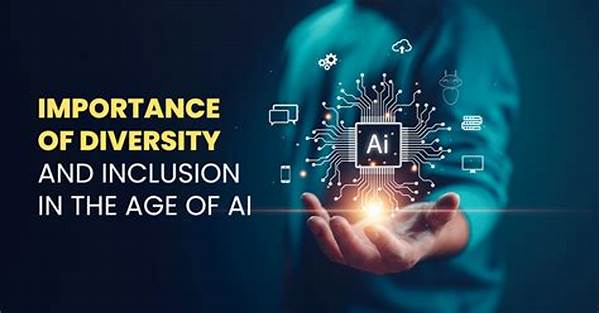H1: Diversity in AI Initiatives
In recent years, the field of artificial intelligence (AI) has experienced exponential growth and transformative impact across various sectors, from healthcare to entertainment. However, as we applaud these technological advancements, there’s a compelling narrative emerging about the importance of diversity in AI initiatives. This narrative centers on the idea that diverse perspectives and inclusive practices are not just a social imperative but a business advantage in the tech world. The question of why diversity matters is not just rhetorical; it is a crucial discussion that defines the future of innovation and ethical responsibility in AI development.
The concept of diversity in AI initiatives spans multiple dimensions, including gender, race, socio-economic backgrounds, and different academic disciplines. It’s no longer sufficient to design AI systems in homogeneous environments. The risks of bias, limited perspectives, and singular worldviews are too significant. Imagine teaching a machine to recognize human emotions or diagnose medical conditions without a diverse input of data and insights. The lack of varied viewpoints could lead to systems that inadvertently perpetuate stereotypes or exacerbate inequalities, affecting millions of lives. Therefore, fostering diversity means fostering creativity and innovation, ensuring that AI technologies are reflective and supportive of the global community they aim to serve.
From a marketing standpoint, promoting diversity in AI initiatives can enhance brand reputation and trust. Companies that actively engage in diverse hiring practices and inclusive cultures often enjoy greater customer loyalty and employee satisfaction. There is an emotional bond created when users see themselves represented in the products and services they use, making it a unique selling point in today’s market. It’s more than just a strategy; it’s an ethical stance that resonates deeply with progressive change-makers and socially conscious consumers.
Diversity in AI initiatives also addresses the rational need for more comprehensive solutions. A monocultural team might miss out on innovative ideas because they lack exposure to different lifestyles and challenges faced by different demographics. By integrating diverse teams, companies unlock a spectrum of possibilities that can lead to groundbreaking advancements. It becomes a fertile ground for creativity, where different perspectives merge to create transformative solutions. This approach doesn’t just solve problems—it prevents them, ensuring that AI develops as a force for good, shaping a future that benefits everyone.
H2: Implementing Diversity in AI for Broader Impact—The Goals of Diversity in AI Initiatives
As the conversation around diversity in AI initiatives continues to evolve, it’s important to understand the underlying goals that drive these efforts. At the core, these initiatives aim to create a more equitable environment where technology is developed and deployed responsibly, underscoring the potential for AI to act as a catalyst for positive societal transformation.
One significant goal of diversity in AI initiatives is to mitigate bias in AI systems. AI models are only as good as the data they are trained on, and without diverse data sets, there is a risk of perpetuating existing biases or even introducing new ones. The presence of diverse teams in AI development plays a crucial role here—they bring a plethora of perspectives that challenge the status quo, paving the way for more inclusive algorithms and reducing the risks of marginalization.
Moreover, diversity in AI initiatives strives to empower underrepresented groups by providing them access to resources and opportunities in the tech industry. This not only helps in nurturing a pipeline of diverse talent but also adds layers of empathy and understanding in technology creation. By sponsoring scholarships, facilitating internships, and launching mentoring programs, companies are investing in a future workforce prepared to tackle the complex challenges of tomorrow.
H2: Nurturing Talent for Diversity in AIH3: Community Engagement and Support Networks
Creating a culture that values diversity entails community engagement, where tech firms proactively interact with educational institutions and minority communities to build trust and inspire potential. Initiatives such as hackathons, workshops, and public speaking opportunities are essential. They showcase real-world applications of AI while highlighting the diversity of thought within these spaces.
Finally, bridging the gap requires the establishment of support networks and advocacy groups that champion the cause of diversity in AI initiatives. These entities serve as liaisons between tech industries and diverse communities, ensuring that dialogue remains open and constructive. By fostering collaborations between industry stakeholders, educational bodies, and policy-makers, these networks facilitate the development of guidelines and best practices for inclusive AI development.
—Summaries on Diversity in AI Initiatives
—Purpose of Diversity in AI Initiatives
The primary objective of diversity in AI initiatives is to establish a balanced and fair AI landscape that truly represents the global population. By prioritizing diverse input and inclusion throughout the AI lifecycle, from conceptualization to deployment, industries can ensure that these technologies serve everyone equally and responsibly. It’s about fostering a culture of empathy and understanding in technological advancements.
Moreover, diversity in AI initiatives aim to dismantle existing barriers and empower a new generation of thinkers and leaders in technology. In providing equal opportunities to underrepresented groups, these initiatives encourage the adoption of AI systems that are not only innovative but also socially relevant. As AI becomes a pillar of future economies, ensuring that its development echoes the voices of all society segments is imperative for sustainable growth and ethical integrity.

